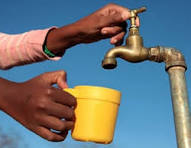South Africa’s Gauteng region is grappling with a severe water shortage, a situation likely to be exacerbated by the anticipated six-month closure of the Lesotho Highland Water Project tunnel for maintenance in October.
Parts of Johannesburg have been without running water for more than two weeks, with officials blaming the dry taps in the city and other parts of Gauteng province on prolonged power outages and a heatwave that has hit the country over the past few months.
According to Johannesburg Water, the shortage – which began on March 3 – has affected the bulk of this city of about six million people, with households, businesses and hospitals hardest hit.
In a statement on Sunday, Johannesburg Water issued a stern warning in which it emphasized that demand is currently outstripping supply.
“The persistent heatwave in the past few weeks and the lack of rain has resulted in high demand,” said the entity, a wholly owned City of Johannesburg subsidiary responsible for providing water and sanitation services in the city.
It called on residents to use water sparingly and adhere to water restrictions that include avoiding watering of gardens, filling up swimming pools, and washing cars with hosepipes between 6am (0400 GMT) and 6pm.
Department of Water and Sanitation director-general Sean Phillips on Sunday blamed the water shortages in Gauteng to lack of maintenance by municipalities in the province.
“The problem is that … when there are heatwaves or when there are disruptions due to, for example, electrical breakdowns then the demand is very close to the available water from rainwater it means that it becomes very difficult for the reservoirs to fill and then supply water to high-lying areas,” Phillips told the state-run South African Broadcasting Corporation.
He added: “So those are the main causes of why we’re in a difficult situation in Johannesburg.”
The water crisis is expected to intensify with the scheduled maintenance closure of the Lesotho Highland Water Project (LHWP) tunnel from October 2024 to March 2025.
The LHWP is as one of Africa’s most ambitious and successful bilateral infrastructure projects.
Initiated in 1986, it harnesses the waters of the Senqu/Orange River in Lesotho to address the growing demand for water in South Africa’s industrial heartland of Gauteng – home to major cities like Johannesburg and Pretoria.
However, with this crucial lifeline expected to be temporarily halted for maintenance for a prolonged period towards the end of this year, concerns have risen over water security in Gauteng and other parts of South Africa.
The Department of Water and Sanitation has warned that stringent conservation measures are essential to mitigate potential crises during this period.
JN/APA


